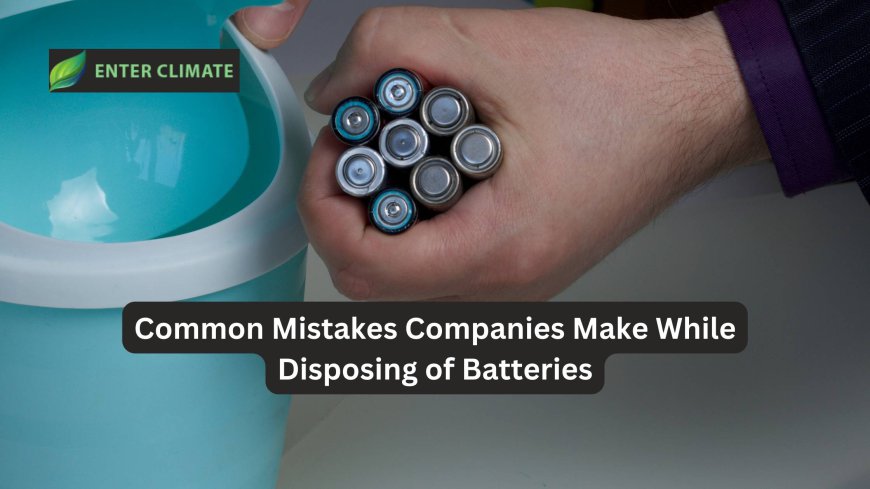Common Mistakes Companies Make While Disposing of Batteries
Discover common mistakes businesses make in battery waste management and learn practical solutions to ensure safe and eco-friendly disposal practices.

Battery waste is a growing concern across industries, especially with the rise of technology and electronic devices. Batteries contain hazardous materials such as lead, cadmium, and lithium, which can cause significant harm to the environment and human health if not disposed of properly. Despite the increasing awareness of sustainable practices, many companies continue to make mistakes in battery waste management. In this blog, we will discuss the most common errors businesses make and provide actionable steps to ensure safe and eco-friendly battery disposal.
1. Throwing Batteries in General Waste
One of the most common mistakes companies make is discarding used batteries in general waste bins. Batteries often end up in landfills where they can leak harmful chemicals into the soil and water. This not only contaminates the environment but also poses severe risks to wildlife and human health.
Solution:
-
Educate employees about the importance of separating battery waste from general waste.
-
Provide clearly labeled collection bins for used batteries in your office or facility.
2. Ignoring Battery Recycling Opportunities
Many companies overlook the benefits of recycling batteries. Recycling helps recover valuable materials like nickel, cobalt, and lithium, which can be reused to manufacture new batteries or other products. Ignoring recycling opportunities not only wastes resources but also contributes to environmental degradation.
Solution:
-
Partner with authorized battery recycling companies.
-
Participate in government or private recycling initiatives to ensure proper disposal.
3. Improper Storage of Used Batteries
Storing used batteries carelessly is another common issue. Batteries left exposed to heat, moisture, or direct sunlight can leak, overheat, or even explode, creating safety hazards in the workplace.
Solution:
-
Store used batteries in a cool, dry place away from flammable materials.
-
Use fireproof containers to reduce the risk of accidents.
-
Regularly monitor the storage area to ensure compliance with safety standards.
4. Disposing of Batteries Without Checking Their Type
Different types of batteries require different disposal methods. For instance, alkaline batteries can often be disposed of in regular trash (in some regions), but lithium-ion batteries need to be recycled. Disposing of all batteries in the same way can lead to environmental harm and legal penalties.
Solution:
-
Train your staff to identify battery types and understand their disposal requirements.
-
Maintain a log of the types of batteries used and their respective disposal methods.
5. Overlooking Government Regulations
India has stringent regulations for battery waste management under the Battery Waste Management Rules, 2022. Many companies fail to stay updated with these rules, leading to non-compliance, fines, and reputational damage.
Solution:
-
Familiarize yourself with the Battery Waste Management Rules, 2022, and other local regulations.
-
Assign a dedicated team or individual to oversee compliance.
-
Work with certified waste disposal partners to meet regulatory requirements.
6. Lack of Employee Training
Employees play a crucial role in ensuring proper battery disposal. However, many businesses do not provide adequate training, leading to incorrect practices such as mixing battery waste with general trash or mishandling hazardous materials.
Solution:
-
Conduct regular training sessions to educate employees about battery waste management.
-
Share best practices and encourage employees to adopt sustainable habits.
7. Disposing Batteries with Charge Left
Batteries that are not fully discharged can cause short circuits or fires during disposal. This is especially risky for lithium-ion batteries, which are highly flammable.
Solution:
-
Ensure all batteries are fully discharged before disposal.
-
Use electrical tape to cover the terminals of batteries to prevent short circuits.
8. Neglecting Data Security in Smart Batteries
Smart batteries used in devices like laptops and smartphones may contain sensitive data. Disposing of these batteries without erasing the data can lead to security breaches.
Solution:
-
Erase all data from smart batteries before disposal.
-
Work with e-waste management companies that specialize in secure data destruction.
9. Underestimating the Importance of Documentation
Proper documentation is essential for tracking battery waste and ensuring compliance with regulations. Many companies fail to maintain records, making it difficult to prove their adherence to environmental standards.
Solution:
-
Maintain detailed records of battery usage, disposal methods, and recycling activities.
-
Use digital tools to streamline documentation and reporting processes.
10. Not Engaging with Certified Disposal Partners
Some businesses choose cost-cutting measures by working with unverified waste handlers. This can lead to improper disposal and increased environmental harm.
Solution:
-
Partner with certified e-waste and battery disposal companies.
-
Verify the credentials and certifications of disposal partners before signing any contracts.
Conclusion
Proper battery waste management is not just an environmental responsibility but also a legal requirement for businesses in India. By avoiding these common mistakes, companies can minimize their environmental impact, enhance workplace safety, and comply with government regulations. Implementing sustainable practices, educating employees, and partnering with certified disposal services are essential steps toward responsible battery waste management.
FAQs
1. What are the risks of improper battery disposal?
Improper disposal of batteries can lead to soil and water contamination, fires, and health hazards due to the release of toxic chemicals.
2. Are all types of batteries recyclable?
Not all batteries are recyclable. Lithium-ion, nickel-cadmium, and lead-acid batteries can be recycled, while some alkaline batteries may not be accepted at all recycling facilities.
3. How can small businesses manage battery waste effectively?
Small businesses can manage battery waste by partnering with local recycling programs, educating employees, and following government regulations on disposal.
